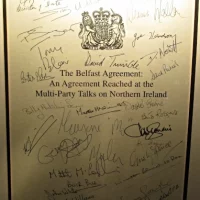Rajiv Gandhi, son of India’s long-time Prime Minister Indira Gandhi, had no intention of entering politics like the rest of his family, but as heir to the Nehru-Gandhi dynasty, such a step was almost pre-ordained. Rajiv Gandhi became India’s seventh Prime Minister on October 31, 1984 just hours after his mother was assassinated by two of… Read More "Reap the Whirlwind — The Assassination of Rajiv Gandhi"
Saving a Lost Generation – The Rush to Adopt Romania’s Orphans
The despotic reign of Romania’s Nicolae Ceauşescu caused deplorable living conditions for Romanians and left its most vulnerable citizens – abandoned children — to be literally warehoused. Orphanages were overrun due to Ceauşescu’s policy of making abortions and contraception illegal while also practically forcing women to have at least four or five children. Most could… Read More "Saving a Lost Generation – The Rush to Adopt Romania’s Orphans"
“The Troubles” between Northern Ireland and Ireland date back to 1167 when England first laid roots in Ireland, but in recent history “The Troubles” refer to the 30 years of conflict over the constitutional status of Northern Ireland. The Unionist side wanted to remain part of the United Kingdom, while the Nationalist and Republican side… Read More "The Northern Ireland Conflict — Peace by Piece"
From ‘Wife of’ to Assistant Secretary of State: Phyllis Oakley Rises Through the State Department
While it was never written into the formal policies of the U.S. Department of State, it had been common practice for women in the Foreign Service to retire once they were married. In the early 1970s, after years of legal challenges from Foreign Service Officer Alison Palmer and others, the State Department finally dropped the… Read More "From ‘Wife of’ to Assistant Secretary of State: Phyllis Oakley Rises Through the State Department"
The Reign of the Snake – The Seedy Tenure of Togo’s President Eyadema
Extravagant dinners with Dom Pérignon and caviar, rampant corruption, political assassinations, a starving populace. Togo had been a small jewel in West Africa in the 1960s, a tourist destination for the French, with fine hotels, a reputation for stability, and a bulwark against Communism. And then it all went to hell. General Gnassingbé Eyadema served as… Read More "The Reign of the Snake – The Seedy Tenure of Togo’s President Eyadema"
Wives and Women in the Foreign Service: The Creation of the Family Liaison Office
A 1957 State Department publication of “Suggestions for Wives from Other Foreign Service Wives” introduced the idea that the main occupational role for wives was the support of their husbands. While never written into the formal regulations of the State Department, it was common practice for women employed in the Foreign Service to resign once… Read More "Wives and Women in the Foreign Service: The Creation of the Family Liaison Office"
Cosa Nostra: U.S. Diplomacy and the Italian Mafia, 1954-1992
The Mafia in American culture is a source of inspiration for books, movies, and television. The Godfather, The Sopranos, a raft of de Niro movies, are just part of a growing genre. But to many Foreign Service Officers working in Sicily in the 1950s and 60s, these wise guys often had a kinder, gentler side… Read More "Cosa Nostra: U.S. Diplomacy and the Italian Mafia, 1954-1992"
Diplomatic Insecurity: The State Department Leaves the U.S. Embassy in Morocco in Peril
Threats against embassies are an ongoing concern that heads of mission, especially in certain parts of the world like the Middle East, must contend with on an ongoing basis. In the post-9/11 world, the State Department has been proactive in building bomb-resistant embassies, beefing up security along the perimeter, and taking steps to ensure the… Read More "Diplomatic Insecurity: The State Department Leaves the U.S. Embassy in Morocco in Peril"
“Our Man is Inside” — The U.S. Ambassador, Kidnapped at a Reception
In Latin America, the mid to late 20th Century was a time characterized by military governments, guerrilla movements, and intense political turmoil — which often led to intense political drama. On February 27, 1980, the Colombian socialist guerrilla group known as the April 19th Movement, or M-19, burst into the Dominican Embassy in Bogota during a… Read More "“Our Man is Inside” — The U.S. Ambassador, Kidnapped at a Reception"
Rehabilitating Former Child Soldiers in Mozambique
Mozambique in the 1980s was a country in the midst of a bloody civil war, when at least 100,000 people were slaughtered in the span of ten years. Both sides, FRELIMO, the National Front for the Liberation of Mozambique, and RENAMO, Mozambique National Resistance, used child soldiers. These children, as well as other children who… Read More "Rehabilitating Former Child Soldiers in Mozambique"

